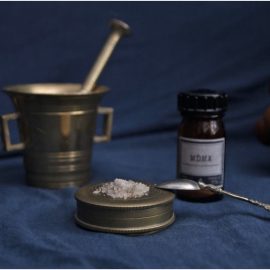
How do unhealthy thoughts change your physical health? How does mental toxicity cause bad decision-making?
Caroline Leaf says that when toxic energy accumulates in your mind and brain, it has negative mental and physical effects. These effects can take a toll on your life if not managed in a healthy manner.
Let’s explore a few of the effects of negative thinking.
Psychological Effects of Mental Toxicity
According to Leaf, some of the psychological effects of negative thinking include:
A heightened stress response: Because there are so many unhealthy thoughts lurking in your mind, you’re more reactive to daily challenges and less able to cope with stress effectively. For example, you may feel overwhelmed by minor inconveniences like traffic.
(Shortform note: Spoon theory may explain why unhealthy thinking makes it more difficult for you to cope with stress. According to spoon theory, people with chronic conditions, including mental health challenges, have a limited amount of energy and resources (represented by “spoons”) to use throughout the day. Each task or stressor requires one or more spoons, and once those spoons are depleted, you may struggle to manage further demands. When unhealthy thoughts consume a large portion of your mental resources, you have fewer spoons left to handle everyday stressors, leading to feelings of overwhelm and reduced coping ability.)
Symptoms of depression and anxiety: Leaf says your unhealthy thoughts can warp your worldview in negative ways. For example, you may feel a pervasive sense of sadness or have persistent fears about various aspects of life. (Shortform note: Experts refer to the kinds of unhealthy thoughts that make you prone to depression and anxiety as cognitive distortions. Cognitive distortions are beliefs that negatively affect your perception of reality, leading you to feel irrational sadness and fear. For example, one common cognitive distortion is known as catastrophizing. When you catastrophize, you expect the worst possible outcome even if it isn’t likely to happen.)
Difficulty making healthy decisions: Because mental toxicity can cloud judgment and diminish motivation, you may find it difficult to prioritize getting enough sleep, exercise, and nutritious food. (Shortform note: Research suggests that unhealthy thinking also diminishes your ability to make healthy decisions by creating stress. When you’re stressed, your brain doesn’t function as well as it normally would—you have trouble weighing the pros and cons of your decisions, planning to take action, and acting on your intentions.)
Physical Effects of Mental Toxicity
Leaf suggests that mental toxicity and negative thinking also have several detrimental physical effects, including:
Poor brain health: Recall that according to Leaf, thoughts exist as both metaphysical energy and as physical structures—so mental toxicity can adversely affect the physical structure and function of the brain. As we discussed, Leaf measures this effect using brain mapping technology that measures coherence.
Increased inflammation: Leaf explains that mental toxicity can cause your body to produce and circulate higher levels of the stress hormones cortisol and homocysteine, which can lead to increased inflammation throughout the body. Leaf also says that physical thoughts have structural deformities that can increase inflammation in the brain. Inflammation in the brain and body can contribute to poorer physical and mental health—for example, it makes you more likely to get sick.
Vulnerability to illness: According to Leaf, the vast majority of illness results from mental toxicity. She explains that mental toxicity makes you more vulnerable to three kinds of illness: First, you’re more vulnerable to lifestyle-related diseases like diabetes due to the difficulty you have making healthy choices. Second, the chronic inflammation you suffer as a result of stress makes you more vulnerable to communicable illnesses like viruses. Third, toxic thoughts can unlock genetic predispositions to illness and rapid aging (which we’ll cover next) via a process called epigenetics, where your behaviors and environment influence the expression of certain genes.
Rapid aging: Leaf says her research shows that mental toxicity causes you to age more rapidly by shortening your telomeres (a part of your DNA whose length is correlated with biological age—in other words, how much your cells have deteriorated): Her research suggests that people with more mental toxicity had shorter telomeres than people with less mental toxicity. She also says that addressing mental toxicity lengthens your telomeres.






